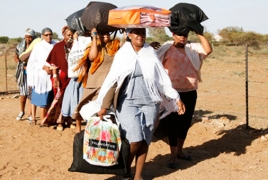 How many cows does your bride cost?Lobola, tribal tradition of biblical times Some tribal traditions remain to be a mystery and a fascination for most of the modern world, although globalization and technologies grant an opportunity to learn more and more about the tribes that live in their own universe and have practices which are exclusively theirs. PanARMENIAN.Net - Throughout Africa a marriage could not take place without some form of gift (or “payment”) of animals, food or other material goods to the parents and family of the bride. Today people speak of this as paying “dowry”. Technically this is not dowry, but ‘bride-price’, ‘bride-gift’, ‘bride-worth’ and the most commonly used word is lobola (or lobolo). Lobola is a demonstration of how much the girl is valued by both sides. It denotes respectability, worthiness and appreciation. As a valued person at marriage, she is not stolen but given away under mutual agreement between the two families. The gift elevates the value attached to her both as a person and as a wife. Starting the process of marriage, lobola is an expression of honor to the parents but also an undertaking of responsibility to the spouse. The process of lobola negotiations can be long and complex, and involves members from both the bride's and the groom's extended families - normally, this would just be the uncles of the marrying parties, as well as the fathers, where custom allows. Women are also sometimes involved but they are mostly observers, not negotiators. Some believe that lobola is a biblical tradition, bringing forth Genesis 24 (Abraham paying lobola for his son, Isaac) and Genesis 29 (Jacob working as payment for lobola to marry Rachael). It is generally accepted that 10 cows, at a minimum, are required in a lobola within the Xhosa and Zulu cultures, however, differing customs within various regions may contribute in determining this amount, as well as the value of each cow. In the course of time, money has replaced cattle and other gifts for dowry in many communities. However, people complain that greed distorted the whole meaning of lobola. Because of paying too much for lobola and preparing for the wedding, many couples start poor with heavy debts. Also, owing to the expensiveness of lobola, many young people decide to cohabit, which is both unAfrican and unbiblical, representatives of His People Church say. Although seen by many as extravagance that has little relevance to the society, where young Africans are struggling poverty, the tradition is still strong. Lobola is believed to be a great way of showing commitment between families, not just between the bride and groom. It is also viewed by some rural African women as a sign of respect that it symbolizes their worth and reinforces their dignity. As a proof of its popularity, Lobola Calculator application has been developed to decide how many cows a bride-to-be is worth. The app requests the users’ age, height, weight and waist size and asks them to rate their attractiveness on a scale of 'not at all' to 'really hot'. But the calculations aren't simply based on physical attributes, the app also bases its calculations on a woman's educational qualifications, their job and whether they have been married before or have children, Daily Mail says. Developer Robert Matsaneng describes the app as 'great for getting a ballpark figure if you're planning on proposing soon, great for breaking the ice on a date and for a laugh with friends.' A disclaimer on a website for the app says the Lobola Calculator is 'just for entertainment and is not intended to replace the true culture and protocols of lobola'. One reviewer praised the Lobola Calculator as 'innovative and relevant,' and a 'fun guideline' for South African men planning to marry. However, some of the feedback has been less constructive, with the Global Post reporting that commentators have requested the developer add extra metric to the equation, suggesting women should also be ranked according to their ethnicity, class and ability to cook. Practiced under different names, lobola is present in our lives. In India, gifts can go from the bride’s family to the groom’s family. The western culture has reduced lobola to a situation where the groom provides the wedding rings. Lusine Mkrtumova / PanARMENIAN.Net How collection of horned creatures turned into museum New York’s first female crime boss World’s largest boneyard An Italian photojournalist’s journey through the pandemic Quarantine in metropoles Town without newborns and dead Nine months in the Pacific |